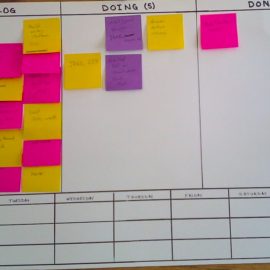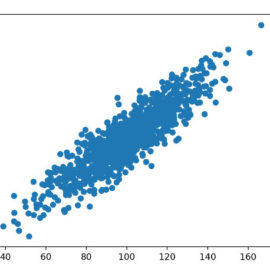

This article is an excerpt from the Shortform book guide to "The Way of Integrity" by Martha Beck. Shortform has the world's best summaries and analyses of books you should be reading.
Like this article? Sign up for a free trial here.
What does it mean to be in alignment with yourself? How can you tell if you’re misaligned? How does misalignment impact your happiness?
Martha Beck argues that misalignment with your true self is the source of most—if not all—chronic psychological misery in our lives. It’s very hard to find happiness if you’re not connecting and listening to your personal nature—the part of yourself that knows what would make you happy.
Keep reading to understand Beck’s theory about happiness and see whether you might find joy by following her advice.
How Living Out of Alignment Makes Us Unhappy
Beck stresses that alignment with yourself is not moral but structural. You aren’t a bad person if you’ve become misaligned—you didn’t make a choice to become misaligned, but rather, you became that way through social and cultural conditioning beyond your control. Nevertheless, you will have a hard time finding long-term psychological well-being if you are detached from your emotions, knowledge, and desires. Without alignment with yourself, your psyche is like a house that is built on a crooked foundation. There might not be any problem in the immediate future, but over a long enough period of time, your house won’t be able to withstand the pressures of the elements and is bound to collapse.
| What Causes Depression? Beck contends that living out of alignment with yourself is the source of most—if not all—chronic psychological misery. However, this is complicated by research into depression, which shows a variety of risk factors. Writing in Lost Connections, journalist Johann Hari claims that depression is caused by three distinct factors: disconnection from social networks, disconnection from your past or future, and biological heritability. Here we’ll compare each of these factors to Beck’s ideas of structural integrity. Disconnection from others includes a lack of meaningful relationships with family or friends and a lack of positive social status or belonging. This isn’t quite the same as individual integrity, but it might be related. If your nature includes a deep desire for social connections—and most people’s do—then failing to achieve these relationships could be a violation of your integrity. Disconnection from your past or future includes an inability to deal with past traumas or view the future with hope and motivation. This factor aligns most closely with Beck’s sense of individual integrity. You aren’t accessing your full nature if you are cut off from the parts of yourself that are carrying trauma or striving to guide your life toward future goals. Biological heritability means that genetics play a role in depression. About 37% of cases of depression involve an inherited genetic susceptibility. Out of all the causes of depression, this one would have the least to do with Beck’s concept of living with integrity. However, Hari contends that even with this susceptibility, depression is usually triggered by the other disconnections described above. |
How Can You Tell If You’re Misaligned?
Beck encourages you to think of your emotional suffering as a natural alarm system. Your body is telling you that something isn’t right in your life and you need to change. She explains four types of suffering that indicate you might be living out of alignment with yourself.
(Shortform note: Beck argues that you should treat your suffering as an internal alarm system, remaining attentive to the symptoms of misalignment. However, in The Art of Happiness, the Dalai Lama suggests that you may first need to accept your suffering before you can begin to learn from it. He argues that suffering is an essential part of life and that you only add additional suffering when you believe you don’t deserve to suffer. He asserts that only once you accept suffering as an inevitable part of life, can you begin to learn from it.)
- Confusion: Your life just “feels off” and you’re not sure why. In your quiet moments, you wonder who you really are and what you want. You struggle to understand why you feel the things you do.
- Aimlessness: It feels like life is just slipping by and none of it adds up to anything. You struggle to concentrate on long-term goals. You don’t see much of a future for yourself. In your quiet moments, you wonder what, if anything, you’re moving toward.
- Emotional misery: You find yourself feeling sad all the time without being able to explain why. Inexplicable misery becomes your default “ordinary” state. You just feel unhappy day to day for no particular reason.
- Consistent failures in your career or relationship: It seems like the important things in your life just keep falling apart no matter what you do. You thought that changing careers or changing relationships would solve your unhappiness, but the same problems seem to just follow you from career to career and relationship to relationship.
| Diagnosing Misalignment How can you tell if you are suffering from any of Beck’s four symptoms of misalignment? You may have negative experiences like the ones she identifies that could be caused by something other than misalignment. In diagnosing yourself with any of these symptoms, it helps to be clear on what each of them is not. 1. Confusion is not disorientation. If you find yourself confused about where you are, what time it is, or even who you are, this is more likely a neurological problem, especially if you are elderly. Contact your doctor if you are experiencing disorientation. 2. Aimlessness is not simply a lack of concrete goals. Motivational experts write that there is a clear difference between dreams and goals. A dream is a fantasy of where you’d someday like to be. A goal is a concrete plan with a deadline that you are currently working towards. You may feel aimless if you have no concrete plans, but the aimlessness Beck describes is a sense of disconnection from your future, a feeling that you’re not sure what’s worth striving towards. 3. Emotional misery is not externally triggered. It’s normal to feel sad for a long time if you’re grieving the loss of a loved one or going through a difficult life transition. However, in each of these instances, you can point to some factor in your life that is making you sad. The emotional misery Beck describes is internally triggered. Your sadness remains consistent regardless of your life’s events. 4. Chronic failures in your career or relationship are not unrelated. This symptom can be the trickiest to identify, as many people experience some kind of setback in their careers or relationships at some point in their lives. When we struggle in our professional or personal lives, it can be hard to figure out why. In determining whether your relationship and career failures are actually caused by misalignment, look for a pattern. Do you find yourself fighting about the same kinds of things in each relationship? Do you find yourself feeling the same kinds of frustration or dissatisfaction at all of your jobs? This may be a sign that internal misalignment is the root of the problem. |

———End of Preview———
Like what you just read? Read the rest of the world's best book summary and analysis of Martha Beck's "The Way of Integrity" at Shortform.
Here's what you'll find in our full The Way of Integrity summary:
- How to know if you're living in alignment with your true self
- How messages from our culture tell us to chase things we don't really want
- The four stages of realigning your life to find happiness






